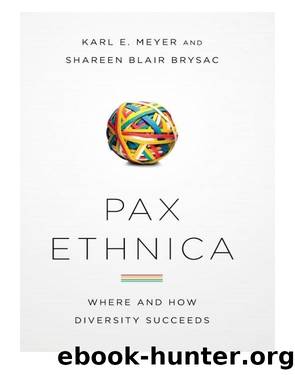Pax Ethnica by Karl E. Meyer

Author:Karl E. Meyer
Language: eng
Format: epub
Publisher: PublicAffairs
Published: 2012-02-02T16:00:00+00:00
BLUE JEANS arguably aside, few American exports are more pervasive than rap, spawned in the urban slums of New York’s South Bronx. There in the early 1980s, the pulsing cadences of black America, the Caribbean, and Latin America fused. Usually sung to a 4/4 beat, often accompanied by a disc jockey’s sampling from a recorded source, rap emerged from noisy neighborhood parties. Afrika Bambaataa, an African-American disc jockey who came of age in the crime-ridden South Bronx, is commonly credited with introducing hip-hop to Europe. A onetime warlord in the Black Spades, said to be New York’s premier street gang, Bambaataa won an essay contest whose first prize was a trip to Africa. On his return, he became a political activist and renamed himself in honor of the Zulu warrior who led a sustained revolt against British control of what became South Africa. In 1984, Bambaataa and his troupe toured Europe and founded a French branch of “the Zulu Nation” in a Paris suburb. His principal disciple was a Senegal-born rapper, MC Solaar, soon to become the voice of the North African underclass in France, his style honed by the tapes he and his cohorts brought back from pilgrimages to the South Bronx.
In Marseille, homegrown rap spread among Maghrebins, many of whose parents were born in Algeria. Most popular was IAM, a group whose lyrics permeate the Marseille trilogy by Jean-Claude-Izzo ( 1945–2000). The self-taught son of a Spanish seamstress and a Naples barman, Izzo was attuned to his city’s corruption, its violence and its anti-Arab prejudices, yet his trilogy remains a loving paean to Marseille. Izzo’s fictional hero is Fabio Montale—un flic de banlieue—a cop whose beat is the tough northern district, who swills pastis at Hassan’s bar. Rap is as central to the trilogy as his friend Honorine’s delectable soup au pistou.
IAM’s name, one theory holds, derives from an early album (De la Planete Mars) with tracks that include “I am from Marseille,” or Mars for short. Another scholar claims IAM is an acronym for Imperial Asiatic Men, or possibly Independents Autonomous Marseille, or that it simply echoes Descartes’s “Cogito ergo sum.” IAM’s concerts in the Dôme de Marseille proved so popular that the Ministry of Culture awarded the group a major prize, partly in tribute to the poetic skills of lead rapper Philippe Fragione. Although IAM’s performers are by origin Italian, Algerian, and Malgache, each rapper assumed an ancient Egyptian name: Akhenaton (Fragione), Shurik’n (Geoffroy Mussard), Khéops (Erik Mazel), Imhotep (Pascal Perez), and Kephren (François Mendy). According to André J. M. Prévos (a scholarly authority on French rap), the group’s “pharaohism” is meant to emphasize its Arabic origins while avoiding the negative stereotypes associated with Islamic extremism—and moreover, serves as a nose-thumb at Paris.
“The two scourges of Marseille,” Izzo quotes IAM as collectively remarking, “are heroin and the National Front.” In the author’s words, Marseille is “a place where people liked to talk a lot. . . . The rappers talked the way people talked in bars: about Paris or the centralized state, the decaying suburbs, the night buses.
Download
This site does not store any files on its server. We only index and link to content provided by other sites. Please contact the content providers to delete copyright contents if any and email us, we'll remove relevant links or contents immediately.
| African-American Studies | Asian American Studies |
| Disabled | Ethnic Studies |
| Hispanic American Studies | LGBT |
| Minority Studies | Native American Studies |
Cecilia; Or, Memoirs of an Heiress — Volume 1 by Fanny Burney(31333)
Cecilia; Or, Memoirs of an Heiress — Volume 3 by Fanny Burney(30934)
Cecilia; Or, Memoirs of an Heiress — Volume 2 by Fanny Burney(30889)
The Great Music City by Andrea Baker(21318)
We're Going to Need More Wine by Gabrielle Union(18074)
Bombshells: Glamour Girls of a Lifetime by Sullivan Steve(13109)
Pimp by Iceberg Slim(12933)
All the Missing Girls by Megan Miranda(12753)
Fifty Shades Freed by E L James(12451)
Norse Mythology by Gaiman Neil(11885)
Talking to Strangers by Malcolm Gladwell(11880)
Crazy Rich Asians by Kevin Kwan(8351)
Mindhunter: Inside the FBI's Elite Serial Crime Unit by John E. Douglas & Mark Olshaker(7835)
The Lost Art of Listening by Michael P. Nichols(6474)
Enlightenment Now: The Case for Reason, Science, Humanism, and Progress by Steven Pinker(6407)
Bad Blood by John Carreyrou(5770)
The Four Agreements by Don Miguel Ruiz(5511)
Weapons of Math Destruction by Cathy O'Neil(5038)
We Need to Talk by Celeste Headlee(4871)
